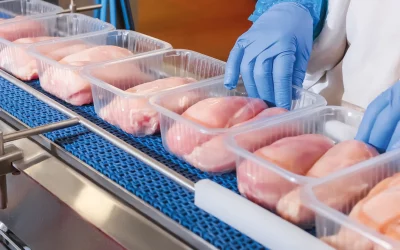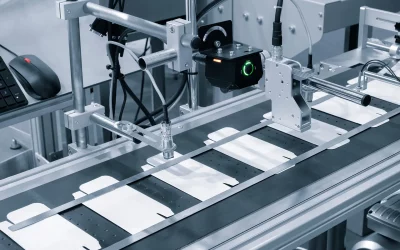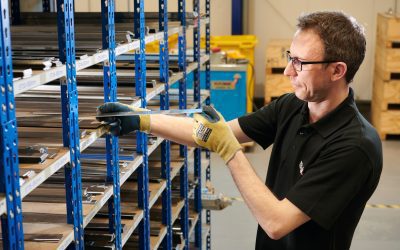By cutting with greater precision, speed, and less waste, industrial knives are setting new standards for what can be achieved, underscoring their importance in this ever-evolving sector. As plastic recycling continues to grow, both in complexity and demand, the role of these cutting-edge tools becomes increasingly central, making a new era in manufacturing that is smarter, cleaner, and more sustainable.
The Role of Industrial Knives in Plastic Recycling
Enhancing Precision and Efficiency
Advanced industrial knives such as granulator blades, shredder knives, and pelletizer knives are essential in plastic recycling, providing precise, efficient, and versatile cutting solutions. These knives, crafted from high-carbon steel and advanced alloys, are crucial for tasks such as cutting large plastic sheets into manageable sizes, trimming excess material, and shaping components. Precision-ground edges and advanced coatings ensure consistent and accurate cuts, speeding up the recycling process and reducing disruptions.
Reducing Waste and Downtime
High-performance industrial knives, such as granulator blades and shredder knives, maintain their sharpness under demanding conditions, reducing the need for frequent replacements. This durability leads to less downtime for blade changes and a more continuous workflow, boosting output and minimising waste. For example, when traditional blades dull quickly, they often tear or miscut plastic materials, leading to significant material waste and the need for reprocessing. Additionally, frequent blade replacements can halt production lines for extended periods, causing costly downtime. Advanced industrial knives’ ability to cut with minimal material deformation or distortion ensures that excess material is minimised, leading to substantial cost savings and a reduced environmental impact.
Economic Advantages
Cost Efficiency
Industrial knives provide a cost-effective solution compared to traditional cutting methods. Their precision and versatility minimise material waste, leading to substantial cost savings. Additionally, the ability to tailor knives to specific requirements eliminates the need for frequent replacements, further contributing to cost-efficiency.
Increased Lifespan of Knives
Manufacturers like MRMK offer high-quality industrial knives crafted from durable materials and advanced coatings, such as titanium nitride (TiN) or diamond-like carbon (DLC). These innovations enhance blade hardness, reduce friction, and increase wear resistance, resulting in an extended lifespan for the knives. Consequently, businesses can enjoy reduced downtime and lower costs associated with frequent replacements.
Lower Energy Consumption
Compared to traditional cutting methods, industrial knives require less energy to operate, translating into significant energy cost savings. This not only reduces operational costs but also aligns with sustainability goals by minimising the carbon footprint.
Environmental Benefits
Supporting Recycling Initiatives
Industrial knives are essential components in the recycling of plastic waste, enabling the effective processing and repurposing of post-consumer and post-industrial plastic materials. Granulator machines, equipped with specialised industrial knives, can be seamlessly integrated into existing processing lines to improve the efficiency and quality of the recycling process. By facilitating the conversion of plastic waste into reusable granules or pellets, industrial knives support circular economy initiatives and promote the sustainable reuse of plastic materials.
Handling a Wide Range of Plastic Types
The versatility of industrial knives allows them to handle a wide range of plastic types, including mono-material packaging, which can be recycled more effectively. This capability aligns with industry guidelines that encourage the use of mono-materials and clear or light-coloured plastics to enhance recyclability and reduce the environmental impact associated with plastic waste.
Advancements in Sustainable Solutions
As sustainability becomes a driving force in the industry, industrial knives will play a crucial role in enabling more environmentally friendly practices. The development of innovative blade coatings and materials will contribute to reducing the environmental impact of plastic recycling. The use of eco-friendly coatings, such as diamond-like carbon (DLC) or titanium aluminium nitride (TiAlN), can significantly extend the lifespan of industrial knives, minimising the need for frequent replacements and reducing waste. Additionally, the adoption of recycled or bio-based materials in blade manufacturing can further lower the carbon footprint of the industry.
By embracing these cutting-edge technologies, manufacturers can position themselves at the forefront of innovation, meeting the ever-growing demand for high-quality recycled plastic products while minimising their environmental impact.
Selecting the right blade involves more than just choosing a sharp tool; it requires understanding the specific needs of your plastic recycling operations and the unique challenges posed by different types of plastic. Whether you’re dealing with delicate plastics that require precise handling or tougher materials that demand more robust equipment, the correct blade can significantly enhance productivity and product quality.
MRMK has the expertise to identify the best industrial knife to optimise your recycling line, helping you to increase efficiency, minimise downtime, and achieve significant cost savings.
Experience the MRMK difference, where exceptional quality and customer satisfaction are our top priorities, ensuring your operations are always a cut above the rest.
Get in touch with us today and experience the MRMK difference.
Explore MRMK’s custom blade solutions now
For more machine blade buying guides, advice and information, read the MRMK News and Insights Hub…
FAQs
What types of industrial knives are most effective for plastic recycling?
Advanced industrial knives such as granulator blades, shredder knives, and pelletizer knives are highly effective for plastic recycling. These knives are crafted from high-carbon steel and advanced alloys, providing precise, efficient, and versatile cutting solutions essential for processing and repurposing various types of plastic materials.
How do advanced industrial knives reduce waste and downtime in plastic recycling operations?
High-performance industrial knives maintain their sharpness under demanding conditions, reducing the need for frequent replacements. This durability minimizes downtime for blade changes, leading to a more continuous workflow and boosting output. By ensuring precise cuts with minimal material deformation, these knives significantly reduce material waste, contributing to cost savings and a reduced environmental impact.
What are the economic and environmental benefits of using industrial knives in plastic recycling?
Industrial knives offer several economic benefits, including cost efficiency through reduced material waste and fewer replacements. Their increased lifespan and lower energy consumption also translate into significant cost savings. Environmentally, these knives support recycling initiatives by enabling effective processing of plastic waste into reusable granules or pellets. Their versatility allows for handling a wide range of plastics, enhancing recyclability and promoting sustainable practices within the industry.


 +44 (0) 1909 519815
+44 (0) 1909 519815 


